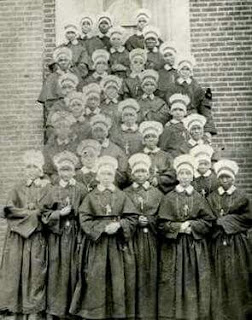As we continue to look at Black Catholics in the Church, we findSISTER ANNE MARIE BECRAFT, an American educator and nun. One of the first African-American nuns in the Roman Catholic Church, she established a school for black girls in Washington, D.C.
Anne Marie was born in 1805 to William and Sara Becraft, prominent free Black Catholics. Her Father, William Becraft, served as chief steward for many years at the Union Hotel and Tavern in the vicinity of what is now M and 30th Streets N.W.
Anne Marie's grandmother, also a free Black, worked as a housekeeper for Charles Carroll (the only Catholic signer of the Declaration of Independence) and was likely his concubine. Carroll presented Annie Marie's father with several of the Carroll family’s prized relics, paintings, and other keepsakes just before Carroll’s death in 1832.
The oldest of seven children, Anne Marie began her formal education at the age of four at the white-operated Potter School in Washington, D.C. Race hostilities forced her to leave the school in 1812. She continued her studies at another white-operated school, New Georgetown, until 1820, when it closed because white involvement in the education of black people was discouraged.
At 15, Anne Marie became the proprietor of a day school for girls in Georgetown.. There was an average of 35 girls who "comprised girls from the best colored families ofOn September 8, 1832, Anne Marie received the religious name Sister Aloysius. The following year she took her vows and became the 11th sister to join the Oblates founded by Mother Lange.* She was a teaching oblate who instructed her students in arithmetic, English and embroidery.
From the age of 15 she had suffered from a chronic chest ailment. In 1833 her condition worsened and she was admitted to the order's infirmary. She died on December 16, 1833, at the age of 28.She was buried in
On April 18, 2017, Georgetown University renamed Remembrance Hall after Sister Anne Marie (Aloysius) Becraft. Anne Marie Becraft Hall is the first building at
The 1870 “Condition and Improvement of Public Schools in the District of Columbia" stated that Becraft "is remembered, wherever she was known, as a woman of the rarest sweetness and exaltation of Christian life, graceful and attractive in person and manners, gifted, well educated, and wholly devoted to doing good.


